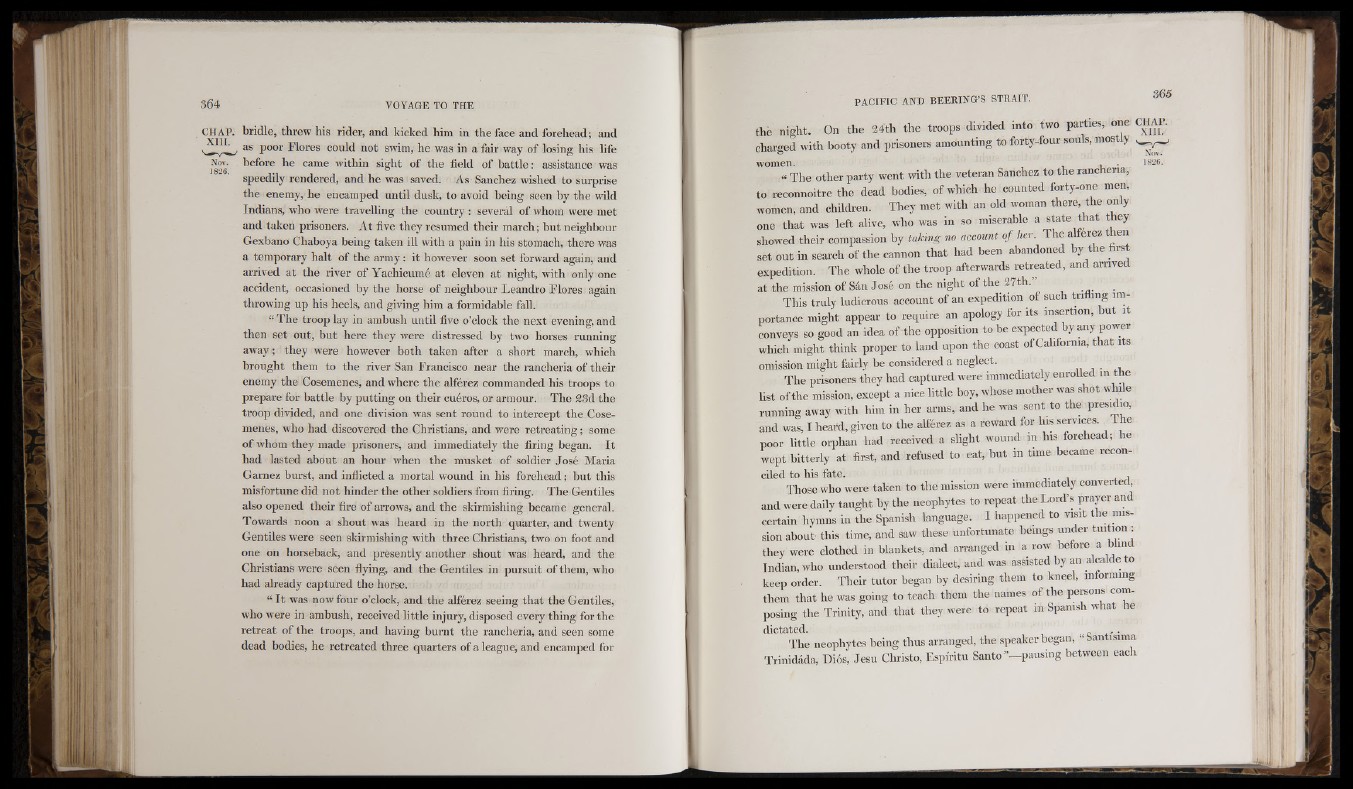
bridle, threw his rider, and kicked him in the face and forehead ; and
, as poor Flores could not swim, he was in a fair way of losing his life
before he came within sight of the field of battle : assistance was
speedily rendered, and he was saved. As Sanchez wished to surprise
the enemy, he encamped until dusk, to avoid being seen by the wild
Indians, who were travelling the country ; several of whom were met
and taken prisoners. At five they resumed their march; but neighbour
Gexbano Chaboya being taken ill with a pain in his stomach, there was
a temporary halt of the army ; it however soon set forward again, and
arrived at the river of Yachicumé at eleven at night, with only one
accident, occasioned by the horse of neighbour Leandro Flores again
throwing up his heels, and giving him a formidable fall.
“ The troop lay in ambush until five o’clock the next evening, and
then set out, but here they were distressed by two horses running
away ; they were however both taken after a short march, which
brought them to the river San Francisco near the ranchería of their
enemy the Cosemenes, and where the alférez commanded his troops to
prepare for battle by putting on their cuéros, or armour. The 23d the
troop divided, and one division was sent round to intercept the Cosemenes,
who had discovered the Christians, and were retreating ; some
of whom they made prisoners, and immediately the firing began. It
had lasted about an hour when the musket of soldier José Maria
Garnez burst, and inflicted a mortal wound in his forehead ; but this
misfortune did not hinder the other soldiers from firing. The Gentiles
also opened their fire of arrows, and the skirmishing became general.
Towards noon a shout was heard in the north quarter, and twenty
Gentiles were seen skirmishing with three Christians, two on foot and
one on horseback, and presently another shout was heard, and the
Christians were seen flying, and the Gentiles in pursuit of them, who
had already captured the horse.
“ It was now four o’clock, and the alférez seeing that the Gentiles,
who were in ambush, received little injury, disposed every thing for the
retreat of the troops, and having burnt the ranchería, and seen some
dead bodies, he retreated three quarters of a league, and encamped for
the night. On the 24th the troops divided into two parties, one C H A P .
charged with booty and prisoners amounting to forty-four souls, most y
Nov.
women. , , •
18 26.
“ The other party went with the veteran Sanchez to the ranchería,
to reconnoitre the dead bodies, of which he counted forty-one men,
women, and children. They met with an old woman there, the only
one that was left alive, who was in so miserable a state Aat they
showed their compassion by taking no account o f her. The afferez t en
set out in search of the cannon that had been abandoned by the first
expedition. The whole of the troop afterwards retreated, and arrived
at the mission of Sán José on the night of the 27th.
This truly ludicrous account of an expedition of such tntting importance
might appear to require an apology for its insertion, but it
conveys so good an idea of the opposition to be expected by any power
which might think proper to land upon the coast of California, that its
omission might fairly be considered a neglect.
The prisoners they had captured were immediately enrolled in the
list of the mission, except a nice little boy, whose mother was shot whde
running away with him in her arms, and he was sent to the presidm,
and was, I heard, given to the alférez as a reward for his services. The
poor little orphan had received a slight wound in his forehead; he
wept bitterly at first, and refused to eat, but in time became reconciled
to his fate. .
Those who were taken to the mission were immediately converted
and were daily taught by the neophytes to repeat the Lord’s prayer and
certain hymns in the Spanish language. I happened to visit the mission
about this time, and saw these unfortunate beings under tuition ;
they were clothed in blankets, and arranged in a row before a blind
Indian, who understood their dialect, and was assisted by an alcalde to
keep order. Their tutor began by desiring them to kneel, informing
them that he was going to teach them the names of the persons composing
the Trinity, and that they were to repeat in Spanish what lie
dictated. .
The neophytes being thus arranged, the speaker began, “ Santísima
Trinidáda, Dios, Jesu Christo, Espíritu Santo’’—pausing between each